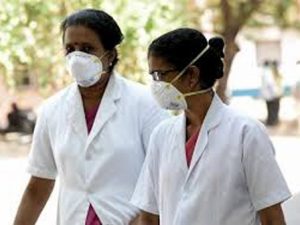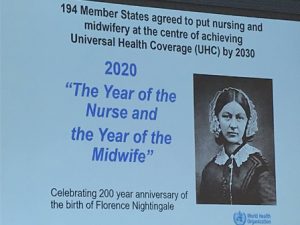Nurses are Frontline Fighters Against COVID-19, But Facing Poor Working Conditions
The fight against COVID-19 would be impossible without the contribution of nurses. WHO has declared 2020 as the year of Nurse and Midwife, however, India need to pay more attention to improve their working conditions, working hours, job security and safety, remuneration, and better access to new technologies, etc.

Those were emotional moments when the entire nation felicitated our medical professionals in gratitude, through clapping, beating drums and Thalis, on 22 March 2020 on the request of our Prime Minister Narendra Modi.
While this act was commendable, we need to carry forward this gratitude and respect beyond situations such as COVID-19. Talking specifically of the nursing and midwifery profession, do we show the same respect for their contribution to health services in our routine encounters with them? What are the working conditions of our nurses? Why are so many nurses migrating to other countries from India? A reflection on these questions is apt at this time as the World Health Organization has declared 2020 as the Year of the Nurse and the Midwife in honour of the 200th birth anniversary of Florence Nightingale. The focus of the year is to call attention to the need to strengthen nursing and midwifery for Universal Health Coverage.
Florence Nightingale is the founder of modern nursing profession, as we all know it. Her story narrates the struggle she faced in carving out professional space and recognition in all areas of life; personal, social and professional, because she decided to become a nurse. She was from a high-class British family. Her family opposed her decision to become a nurse as nursing was considered as a menial job by the higher classes. For gaining professional recognition, she meticulously proved through evidence how good nursing care of which, hygiene and sanitation is the most essential, could reduce patient healing time and also mortality in hospitals. Since then, in the western countries, the perception of nursing being a low menial job is history. Nurses in current times enjoy respect, recognition, have a higher scope of practice and higher status compared to nurses In India.
Also Read : Covid 19 In India Immense Role For Healthcare Field Workers
In modern medical systems, nursing care is firmly established as an essential service. Nurses are frontline workers in all healthcare settings. Nurses spend a great deal of time with patients; assessing and observing, helping doctors create a care plan, and implementing the care plan in terms of dispensing medicines and treatment. Educating and counselling patients to adhere to treatment, and promote health is another important part of their job. Nurses are managers, setting up and maintaining systems for quality and infection control in hospitals. Needless to say, they are the backbone of the health system. There is no doubt that the fight against COVID-19 would be impossible without the contribution of nurses.
It is estimated by the Indian Nursing Council and WHO that India had 1.23 million nurses and midwives in 2010, nearly 1/3rd of the total health workforce.

Yet, India faces an acute shortage of nurses especially in the rural areas. This is in spite of a greater production capacity in terms of available seats in nursing educational institutions throughout the country. One reason being, a large number of nurses migrate to other countries. A case study carried out by WHO on the migration of nurses from Kerala in 2017 showed that between 25–33 per cent of nurses trained in Kerala migrated overseas. According to the same WHO report, for nurses trained in India, the pull factors to migrate to other countries are improved salaries, working conditions, and job security, access to better health care technologies and enhanced opportunities for the family. Further, Indian nurses, on the whole, are often faced with long working hours, lower salaries, stigma against the profession, and lack of autonomy and dignity in the workplace within the country giving rise to push factors that influence decisions to migrate.
In India, a fresh graduate nurse gets anywhere between INR 8,000–15,000, and this profession is a specialized service. The drivers and office boys, which are unskilled or low skilled jobs, get the same amount. These are contract jobs with no career growth or job security. These nurses have high workload. It is not uncommon to find one nurse managing 2–3 wards full of patients single handedly, apart from attending women in labour during the night in government hospitals.
Majority of the nurses are women. In a large hospital, at any given, time there could be 100-600 nurses employed. Facilities such as safe changing/restrooms, crèche facilities for their children are not a common management and welfare practice. Nurses have to perform night shifts. Safety at work is also an issue. There have been cases such as Sister Aruna Shanbaug which could be tip of an iceberg. A study from Kolkata by Paramita Chaudhary in 2007, shows that out of 135 female staff in a hospital which included female doctors, 41 reported facing verbal harassment, 45 reported psychological harassment and 27 reported unwanted touch.
Also Read : Appeal For Free Testing And Free Treatment For Covid 19 Letter To Pm Modi
Professionally, the Indian nurses have low status as they are general staff nurses shifted from one speciality to another. This prevents them from achieving the professional respect of being an ‘expert’ enjoyed by other professionals such as doctors.
Nurses in western countries have a much wider scope of practice and autonomy indicating recognition of their work and professional contribution.
Though things have improved from the past, the social image of nurses in India is still negative. One reason is that caring functions of a nurse, and midwife, brings them in direct contact with body fluids, which culturally are considered as polluting. Nurses being women have to touch male patients which are culturally associated with having a loose character. This negative cultural image of occupation has effects on the self-worth and self-respect of its representatives and their worth in the professional and social worlds.
In spite of the mass show of appreciation on 22nd March, we see video clips from around India of mobs chasing and beating up health professionals who are trying to track COVID-19 patients and performing their duties. Let this commendable gesture initiated by our PM Modi, of appreciating the health professionals in the crisis of COVID-19, become genuinely internalized in the hearts of citizens. Let us join hands with the governments to improve the working conditions of our health personnel so that they can serve us better.
(Slider Photo: Nurse Reshma Mohan Das in Kotayam, Kerala, who as infected coronavirus while treating corona patients was cured and discharged. She wants to come back and join the duty after her quarantine period)
